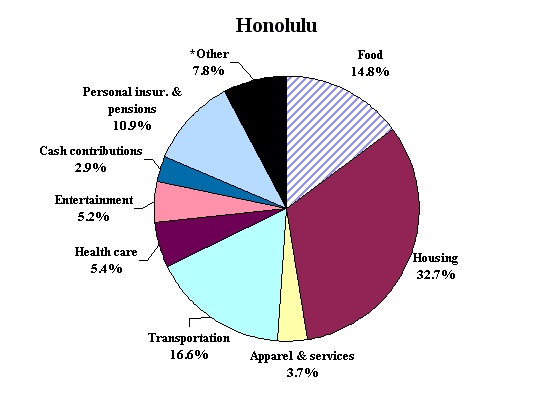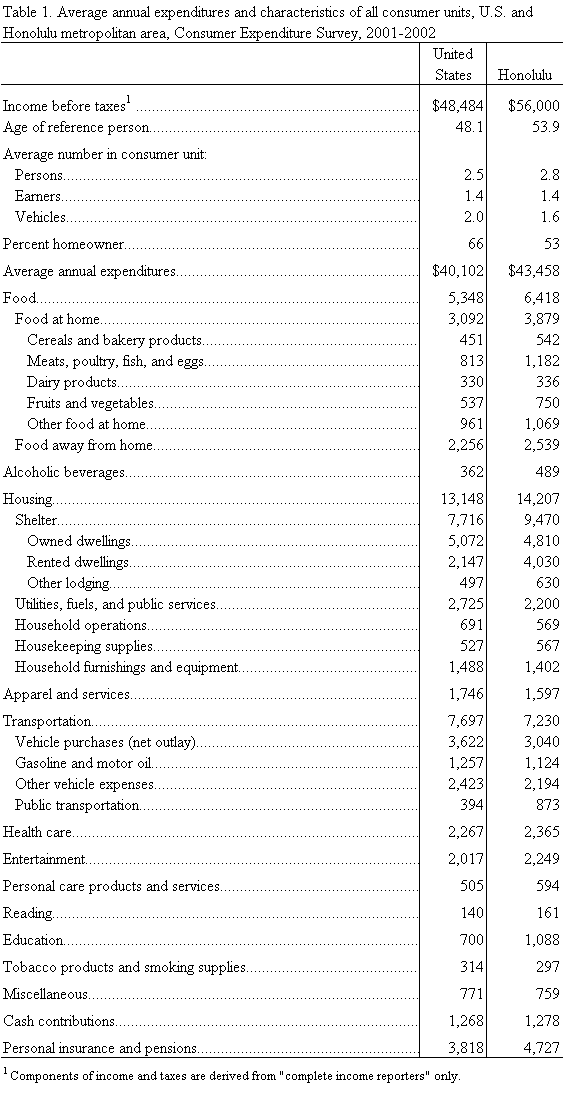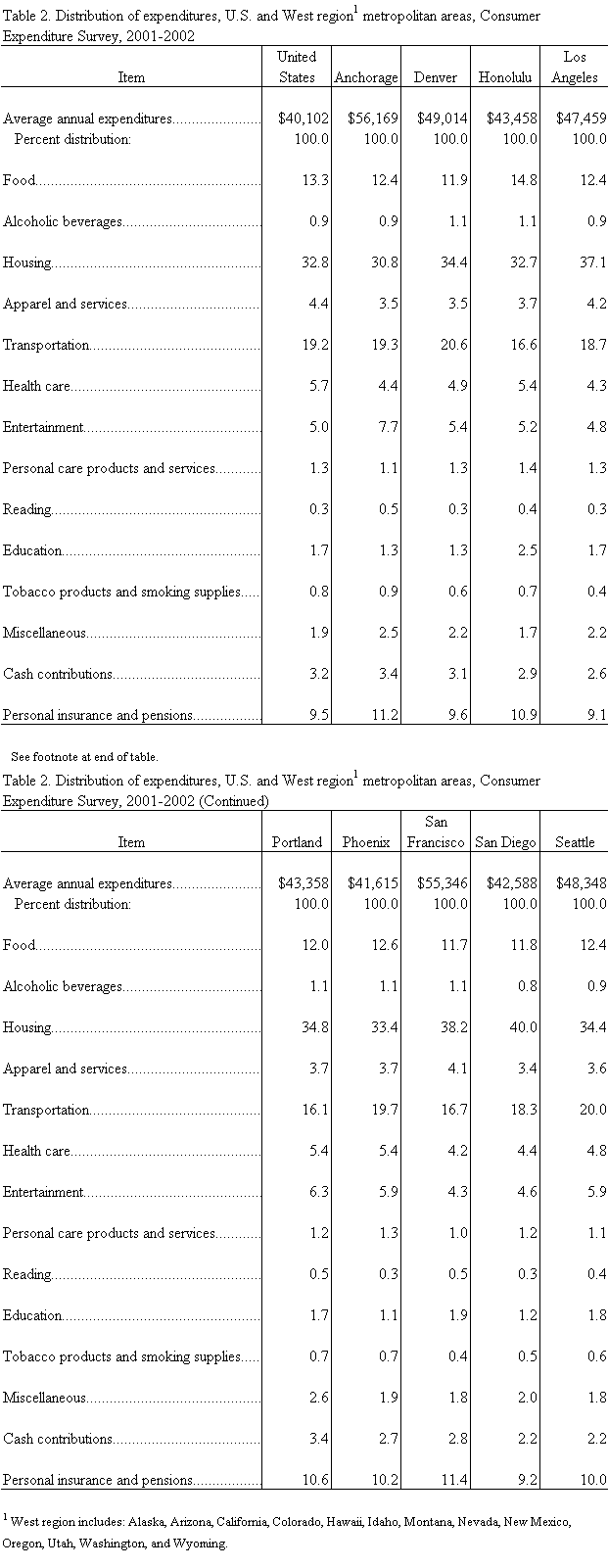|
CONTACT: Media Interviews (415) 975-4382 (415) 975-4403 Internet address: http://www.bls.gov/ro9/news.htm Fax-On-Demand (415) 975-4567 - Code: #9750
BLS 04-31 |
CONSUMER SPENDING PATTERNS IN
HONOLULU, 2001-2002
Consumer units1 in the Honolulu, Hawaii metropolitan area spent $43,458 per year in 2001-2002, 8.4 percent more than the national average according to the latest Consumer Expenditure Survey results from the Bureau of Labor Statistics of the U.S. Department of Labor. Acting Regional Commissioner Nancy A. Treadwell noted that expenditures for food in Honolulu were 20.0 percent higher than for the nation and made up a larger than average share of a household's budget in 2001-2002. Spending on education was also notably higher than the national expenditure at 55.4 percent above the average. Transportation costs, on the other hand, fell below the norm and represented a smaller than average share of the total budget in Honolulu than it did nationwide The average household in Honolulu reported income of $56,000 before taxes, and was comprised of 2.8 persons and 1.4 wage earners. (See table 1.)
Chart A. Percent distribution of total average expenditures, 2001-2002

The percentage of the total budget spent by a typical Honolulu household for food, housing, and transportation was 64.1 percent, a bit below the 65.3 percent spent by an average U.S. household. In comparison to the eight other metropolitan areas surveyed in the West region, households in Anchorage spent the smallest percentage (or share) of their budget on these three components--62.6 percent, while households in San Diego had the highest combined expenditure share at 70.2 percent. (See table 2. Geographical boundaries of the region and metropolitan areas referenced in this release are contained in the Technical Note.)
This report contains annual data averaged over a two-year period, 2001 and 2002. The data are from the Consumer Expenditure Survey (CE), which is conducted on an ongoing basis by the Bureau of Labor Statistics (BLS). The U.S. Census Bureau collects the survey data for BLS. The CE is the only national survey that provides both complete data on household expenditures and the demographic characteristics of those households. Survey data cannot be used to make cost of living comparisons between areas. Expenditure levels vary among areas not only because of economic factors such as the prices of goods and services and family income, but also because of differences such as the age of the population, climate, consumer tastes, family size, etc. However, expenditure shares (or the percentage of a consumer unit's budget spent on a particular item) can be used to compare spending patterns across areas. Data shown are annual averages per consumer unit. An individual consumer unit may spend more or less than the average, depending on its particular characteristics.
Housing expenses accounted for 32.7 percent of total expenditures in the Honolulu area, similar to the national average of 32.8 percent. At 30.8 percent, Anchorage had the smallest expenditure share for housing among the other eight metropolitan areas in the West, while San Diego had the largest at 40.0 percent. The majority (66.7 percent) of a consumer unit's housing costs in Honolulu went for shelter, which includes mortgage interest, property taxes, repairs, and rent, among other items. Utilities, fuels, and public services comprised 15.5 percent of the Honolulu housing budget. In comparison, a typical household in the United States spent 58.7 percent of the housing budget on shelter, but 20.7 percent for utilities, fuels, and services. (See table 1.) The rate of homeownership in Honolulu, 53 percent, was considerably lower than the national average of 66 percent; in fact, it was the lowest percentage among the nine metropolitan areas in the West.
Transportation was the second largest expenditure category in the Honolulu area accounting for 16.6 percent of a household's budget, one of the lowest shares in the West region. Nationally, transportation made up 19.2 percent of all expenditures. Households in Honolulu allocated a considerably smaller portion of their transportation dollars for vehicle purchases than did consumer units nationwide (42.0 versus 47.1 percent). Households in Honolulu also owned fewer vehicles per household than the national average (1.6 versus 2.0). Public transit, which includes airline travel as well as buses, taxis, subways and trains, represented 12.1 percent of a Honolulu household's transportation budget, highest in the region and far exceeding the 5.1 percent allocated nationally. In fact, of the 28 metropolitan areas surveyed across the nation, Honolulu was second only to New York (14.0 percent) in the percentage of transportation dollars spent on public transit.
Food accounted for 14.8 percent of total expenditures in the Honolulu area, the highest allocation among the nine metropolitan areas surveyed in the West, and above the 13.3 percent national average. Consumer units in Honolulu spent a smaller than average portion of their food budget on food prepared away from home, such as restaurant meals, carry-outs, board at school, and catered affairs-39.6 percent versus 42.2 percent, nationally.
Honolulu residents spent more of their total budget on personal insurance and pensions, 10.9 percent, than did the typical U.S. household, 9.5 percent., Honolulu households also had a higher than average expenditure share for education-2.5 percent versus 1.7 percent nationally; this was the highest percentage of any metropolitan area in the West.
Still, expenditure shares for some categories were close to those for the U.S. Out-of-pocket medical expenses contributed to 5.4 percent of the total expenditures in Honolulu and 5.7 percent, nationally. Entertainment accounted for 5.2 percent of Honolulu budgets, close to the 5.0 percent U.S. average.
Honolulu is one of nine metropolitan areas in the West region for which Consumer Expenditure data are available. Data tables are also available for 29 metropolitan areas, the four Census regions, and the nation on the BLS Internet site http://www.bls.gov/cex/ in both text and PDF formats. For personal assistance or further information on the Consumer Expenditure Survey, as well as other Bureau programs, contact the San Francisco Information Office at 415-975-4350.
1See Technical Note for definition of a consumer unit. The terms consumer unit and household are used interchangeably throughout the text for convenience.
The current Consumer Expenditure Survey program began in 1980. Its principal objective is to collect information on the buying habits of American consumers. The consumer expenditure data are used in a wide variety of research by government, business, labor, and academic analysts. The data are also required for periodic revision of the Consumer Price Index.
The survey consists of two components, a Diary or recordkeeping survey, and an Interview survey. The Diary survey, completed by participating consumer units for two consecutive 1-week periods, collects data on frequently purchased, smaller items. The Interview survey, in which the expenditures of consumer units are obtained in five interviews conducted every 3 months, collects data for larger-cost items and expenditures that occur on a regular basis. The U.S. Census Bureau collects the survey data.
Each component of the survey queries an independent sample of consumer units which is representative of the U.S. population. Over the year, about 7,500 consumer units are sampled for the Diary survey. The Interview sample is conducted on a rotating panel basis, with about 7,500 consumer units participating each quarter. The data are collected on an ongoing basis in 105 areas of the country.
The integrated data from the BLS Diary and Interview surveys provide a complete accounting of consumer expenditures and income, which neither survey component alone is designed to do. Due to changes in the survey sample frame, metropolitan area data in this release are not directly comparable to those prior to 1996.
The expenditure data in this release should be interpreted with care. The expenditures are averages for consumer units with the specified characteristics, regardless of whether a particular unit incurred an expense for a specific item during the recording period. The average expenditure may be considerably lower than the expenditure by those consumer units that purchased the item. This study is not intended as a comparative cost of living survey as neither the quantity nor the quality of goods and services has been held constant among areas. Differences may result from variations in characteristics such as consumer unit size, age, income levels, etc. Users should keep in mind that prices for many goods and services have risen since the survey was conducted.
In addition, sample surveys are subject to two types of errors. Sampling errors occur because the data are collected from a representative sample rather than the entire population. Nonsampling errors result from the inability or unwillingness of respondents to provide correct information, differences in interviewer ability, mistakes in recording or coding, or other processing errors. The year-to-year changes are volatile and should be interpreted carefully. The sample survey for the nation is much larger than for individual metropolitan areas, meaning the resulting national estimates are more reliable than those for the metropolitan areas.
Some expenditure components are subject to large fluctuations from one year to the next because these components include expensive items that relatively few consumers purchase each year. Thus, shifts from year to year in the number of consumers making such purchases can have a large effect on average expenditures. Examples of these types of expenses are purchases of new cars and trucks in the transportation component, and spending on boats and recreational vehicles in the entertainment component.
The Metropolitan Statistical Areas (MSAs) and Consolidated Metropolitan Statistical Areas (CMSAs) covered by the Consumer Expenditure Survey represent areas designated by the U.S. Office of Management and Budget and are based on definitions in effect as of December 1992. The general concept of an MSA is one of a large population nucleus, together with adjacent communities which have a high degree of economic and social integration with that nucleus. The following metropolitan areas are discussed in this release:
Honolulu, HI MSA which is comprised of Honolulu County;
Los Angeles-Riverside-Orange County, CA CMSA which is comprised of Los Angeles, Orange, Riverside, San Bernardino, and Ventura Counties;
San Francisco-Oakland-San Jose, CA CMSA which is comprised of Alameda, Contra Costa, Marin, Napa, Santa Clara, Santa Cruz, San Francisco, San Mateo, Solano, and Sonoma Counties;
San Diego, CA MSA which is comprised of San Diego County;
Portland-Salem, OR-WA CMSA which is comprised of Clackamas, Columbia, Marion, Multnomah, Polk, Washington, and Yamhill Counties, Oregon and Clark County, Washington;
Seattle-Tacoma-Bremerton, WA CMSA which is comprised of Island, King Kitsap, Pierce, Snohomish, and Thurston Counties;
Anchorage, AK MSA which is comprised of Anchorage Borough;
Phoenix-Mesa, AZ MSA which is comprised of Maricopa and Pinal Counties;
Denver-Boulder-Greeley, CO CMSA which is comprised of Adams, Arapahoe, Boulder, Denver, Douglas, Jefferson and Weld Counties; and
New York-Northern New Jersey-Long Island, NY-NJ-CT-PA CMSA which is comprised of Bronx, Dutchess, Kings, Nassau, New York, Orange, Putnam, Queens, Richmond, Rockland, Suffolk and Westchester counties in NY; Bergen, Essex, Hudson, Hunterdon, Mercer, Middlesex, Monmouth, Morris, Ocean, Passaic, Somerset, Sussex, Union and Warren counties in NJ; and Fairfield, Litchfield, Middlesex and New Haven counties in CT; and Pike county in PA.
The Consumer Expenditure Survey also provides data for the four geographic regions of the country as defined by the U.S. Census Bureau-Northeast, South, Midwest, and West. Data for metropolitan areas presented in table 2 of this release are part of the West region which includes the states of Alaska, Arizona, California, Colorado, Hawaii, Idaho, Montana, Nevada, New Mexico, Oregon, Utah, Washington, and Wyoming.
Definitions
Consumer unit - members of a household related by blood, marriage, adoption, or other legal arrangement; a single person living alone or sharing a household with others but who is financially independent; or two or more persons living together who share responsibility for at least 2 out of 3 major types of expenses - food, housing, and other expenses. The terms household or consumer unit are used interchangeably for convenience.
Complete income reporter - in general, a consumer unit that provides values for at least one of the major sources of its income such as wages and salaries, self-employment income, or Social Security income. Even complete income reporters may not have provided a full accounting of all income from all sources.
Expenditures - consist of the transaction costs, including excise and sales taxes, of goods and services acquired during the interview or recordkeeping period. Expenditure estimates include expenditures for gifts, but exclude purchases or portions of purchases directly assignable to business purposes. Also excluded are periodic credit or installment payments on goods or services already acquired. The full cost of each purchase is recorded even though full payment may not have been made at the date of purchase.
Income before taxes - the total money earnings and selected money receipts during the 12 months prior to the interview date.


Last Modified Date: April 30, 2004

